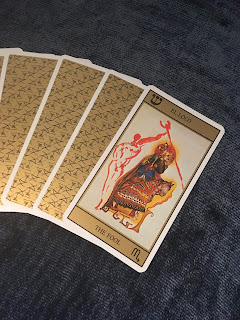On Magical Appropriation
Though magical exploration is a fundamental aspect of developing one's craft, I support the stance that some cultures or traditions are "closed" to outsiders. This applies to traditions outside your racial/ethnic group or religion, especially if colonialism, racism, or other forms of oppression have erased or stigmatized such groups.
For example, a white person appropriating aspects of Native American belief systems (ei spirit animals, smudging sage, peyote, etc.) into their own craft disrespects the complex significance of such elements, which are sacred to a specific tribe or culture. For white people, this rule also applies to Haitian voodoo, Tibetan tulpas, African shamanism, and Eastern religions of which you are not a converted member, to name a few.
As a general rule, I believe in respecting all cultures, and in order to do this, white people should not take from cultures, peoples, and traditions that our ancestors historically colonized.
Even if you have good intentions, you will probably misuse or misunderstand elements from cultures of which you are not a member, so to avoid disrespecting or harming others, consider such traditions closed to you. Instead, appreciate those cultures and magical practices from afar by educating yourself about them!
There are a multitude of European magical traditions available to white people, including British witchcraft and folk magic, Celtic paganism, Italian stregheria, Hellenism, and etc. Most Western witchcraft religions like Wicca are open to anyone, and many forms of secular, nontraditional witchcraft, like chaos magic, exist for people of all backgrounds.
Join a local coven, follow an online community, or become a solitary witch and create your own practice!
Colonization refers to the global theft of land, languages, traditions, and rights from indigenous people by European ethnic groups and its prevailing effects in modern society, like institutionalized racism, cultural fetishism, and social disenfranchisement. Historic examples include the British empire, Spanish conquistadors, Italian explorers, Dutch imperialists, and American slavers. On a global scale, the colonizers, or "first-world countries," perpetuate this inequality against the colonized, or "third-world countries," via the combined effects of capitalism, racism, xenophobia, and religious intolerance.
For example, a white person appropriating aspects of Native American belief systems (ei spirit animals, smudging sage, peyote, etc.) into their own craft disrespects the complex significance of such elements, which are sacred to a specific tribe or culture. For white people, this rule also applies to Haitian voodoo, Tibetan tulpas, African shamanism, and Eastern religions of which you are not a converted member, to name a few.
As a general rule, I believe in respecting all cultures, and in order to do this, white people should not take from cultures, peoples, and traditions that our ancestors historically colonized.
Even if you have good intentions, you will probably misuse or misunderstand elements from cultures of which you are not a member, so to avoid disrespecting or harming others, consider such traditions closed to you. Instead, appreciate those cultures and magical practices from afar by educating yourself about them!
There are a multitude of European magical traditions available to white people, including British witchcraft and folk magic, Celtic paganism, Italian stregheria, Hellenism, and etc. Most Western witchcraft religions like Wicca are open to anyone, and many forms of secular, nontraditional witchcraft, like chaos magic, exist for people of all backgrounds.
Join a local coven, follow an online community, or become a solitary witch and create your own practice!
Definitions
 |
| Cultural imperialism continues today |


Comments
Post a Comment